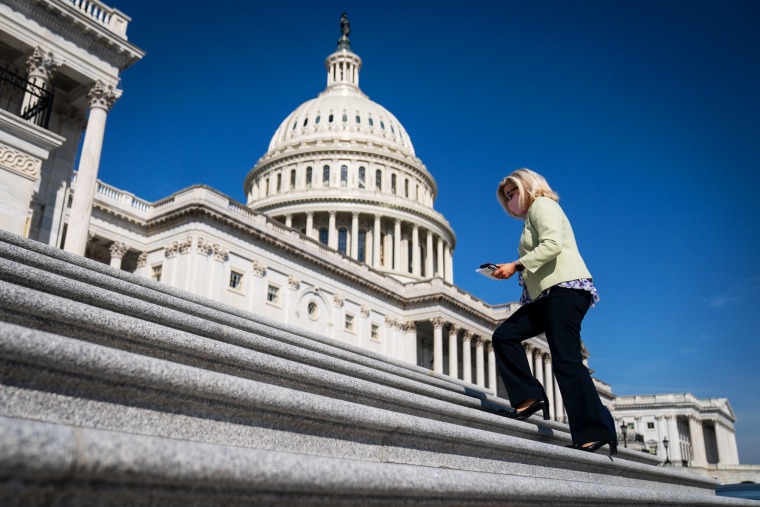House Republican Conference Chair Liz Cheney (R-Wyo.) has faced pockets of criticisms from small, far-right contingents, but the partisan pushback she's facing now is qualitatively different from anything any congressional leader has faced in recent memory.
In the wake of the Wyoming congresswoman rejecting Donald Trump and endorsing the legitimacy of the 2020 presidential election, Republican leaders have turned on her with a vengeance, putting her career in GOP politics in jeopardy. Indeed, as of yesterday, the question was less about whether she'll be ousted from her leadership post, and more about when the inevitable will happen.
With this in mind, Cheney wrote an op-ed for the Washington Post, effectively making the case for her vision of contemporary conservative thought. It's a striking piece, asking Republicans not to let her keep her job, but rather, asking Republicans to resist the urge to abandon democracy.
After pointing to evidence in support of President Joe Biden's victory, the House GOP Conference chair explained that she's "worked overseas in nations where changes in leadership come only with violence, where democracy takes hold only until the next violent upheaval. America is exceptional because our constitutional system guards against that. At the heart of our republic is a commitment to the peaceful transfer of power among political rivals in accordance with law."
Adding to the broader point, Cheney went on to write:
While embracing or ignoring Trump's [anti-election] statements might seem attractive to some for fundraising and political purposes, that approach will do profound long-term damage to our party and our country.... History is watching. Our children are watching. We must be brave enough to defend the basic principles that underpin and protect our freedom and our democratic process. I am committed to doing that, no matter what the short-term political consequences might be.
Of course, in the same piece, the Wyoming Republican also urged her party to "steer away from the dangerous and anti-democratic Trump cult of personality," which is precisely the kind of rhetoric that put her future in jeopardy in the first place.
The op-ed seems unlikely to change the trajectory of the debate, and much of the piece is more likely to resonate with Democrats -- or more accurately, democrats -- than her Republican brethren.
But Cheney's piece also devoted some time to her conservative ideology. "We believe in the rule of law, in limited government, in a strong national defense, and in prosperity and opportunity brought by low taxes and fiscally conservative policies," she wrote. "There is much at stake now, including the ridiculous wokeness of our political rivals, the irrational policies at the border and runaway spending that threatens a return to the catastrophic inflation of the 1970s."
There's a fascinating political dynamic that came to the fore a handful of times during Donald Trump's presidency: Republicans who disagreed with Democrats about practically everything, except Trump and the dangers of authoritarianism.
Michigan's Justin Amash and Illinois' Adam Kinzinger, for example, received some plaudits from the left for their anti-Trump positions -- despite their disagreements on most policy issues -- similar to the praise Cheney is receiving now.
But the fact remains Cheney isn't a moderate. There's nothing even remotely moderate about her, her record, or her approach to governance. When it comes to every major policy debate under the sun, Democrats and the House Republican Conference chair agree on practically nothing. The same was true with Amash and Kinzinger, whose beliefs reinforced the larger point: opposing Trump and believing in elections is not necessarily evidence of sympathy for progressive ideals.
Democrats' support for Cheney, to the extent that anyone could fairly characterize it as "support," is limited to her clearing the lowest of all possible bars: the Wyoming lawmaker has endorsed the value of democracy. As Jon Chait noted this morning, "There's only one issue on which I agree with Liz Cheney.... It's the only issue that really matters right now."
Cheney believes Trump is "seeking to unravel critical elements of our constitutional structure that make democracy work." From my perspective, the House Republican Conference chair isn't right about much, but she's right about this, and it's the accuracy of her assessment -- and her willingness to articulate it -- that may very well end her career in GOP politics.
This post has been edited slightly for clarity.

